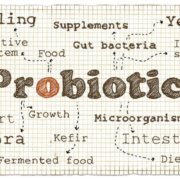Health Benefits of SCFA
Let’s continue our look at short-chain fatty acids (SCFA) and what they do besides produce energy. Most of these are observational in nature; by that I mean when SCFA go up or down, effects are observed. What we don’t know at this point is why.
For example, when diabetic animals are given the SCFAs acetate and propionate, they maintain better glucose control. That means that adding SCFA to their diet can improve their ability to maintain blood sugar levels. Wait a second; is this the same acetate that’s found in vinegar? Yes. The problem is that the studies don’t provide consistent results.
The same is true for fat storage. When SCFA levels go up, fat storage appears to go down, but drinking vinegar doesn’t necessarily provide that benefit. Observational studies show that as SCFA levels made by the body go up, fat storage goes down. That can prevent weight gain, but we don’t know whether it causes weight loss. The same is true for cholesterol levels; SCFA are associated with lower cholesterol levels.
The problem is that we don’t know the precise mechanisms yet. In other words, what does making SCFA do to the metabolic systems in the body? To the genes? Or receptors for various functions? That’s what scientists are working on. Further, exactly what type of bacteria produce the right SCFA? There’s general agreement that Bifidobacteria produce acetate and propionate when fermenting fiber, but which Bifidobacterium? There are over 50 varieties. Maybe more than one—they may interact in sequence. We don’t know at this point.
What role do SCFA have in controlling blood pressure? Does sodium also have an impact on SCFA production? We’ll take a look at a recent study on Saturday.
What are you prepared to do today?
Dr. Chet
References:
1. Benoit Chassaing, Andrew T. Gewirtz, in Physiology of the Gastrointestinal Tract (Sixth Edition), 2018.
2. Front Microbiol. 2016; 7: 925. doi: 10.3389/fmicb.2016.00925









